Toshiba Portege R835: Less Ultra, More Notebook
by Dustin Sklavos on March 30, 2012 11:35 AM EST- Posted in
- Laptops
- Intel
- Toshiba
- Sandy Bridge
- Notebooks
System Performance
Essentially what we're dealing with when we look at the Toshiba Portege R835's full voltage mobile processor is just how much performance an ultrabook sacrifices to hit that 17W TDP on the CPU. There's more to it than that, but there are also potentially some interesting wrinkles going on with the Intel Core i5-2450M in the R835 that may manifest themselves.
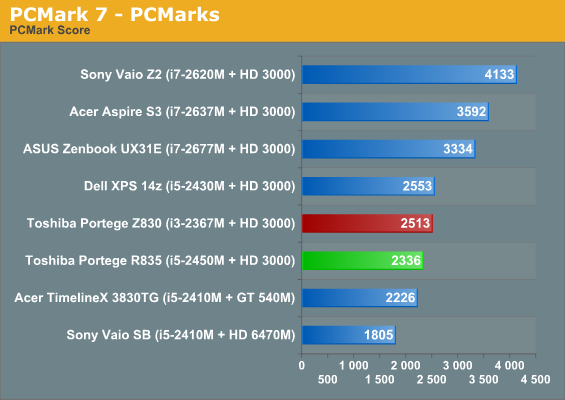
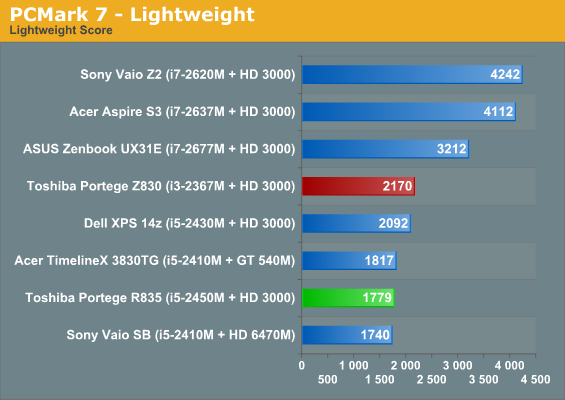
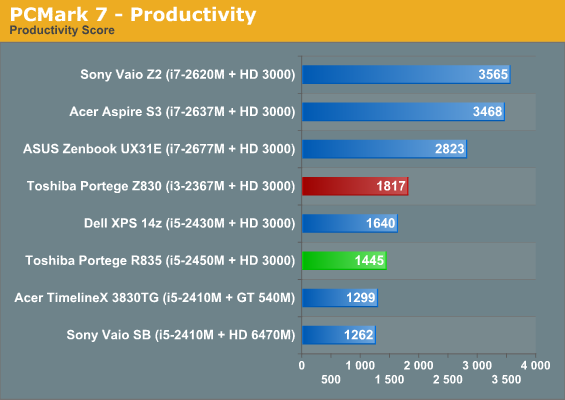
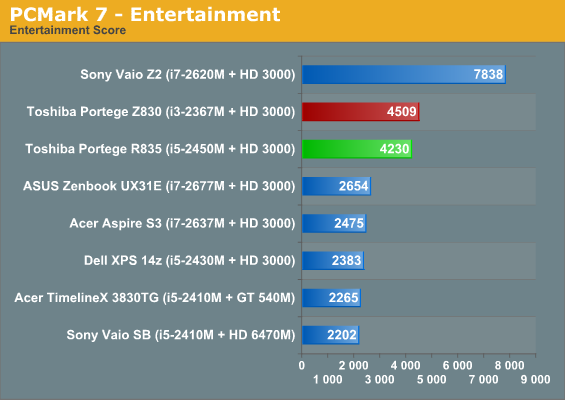
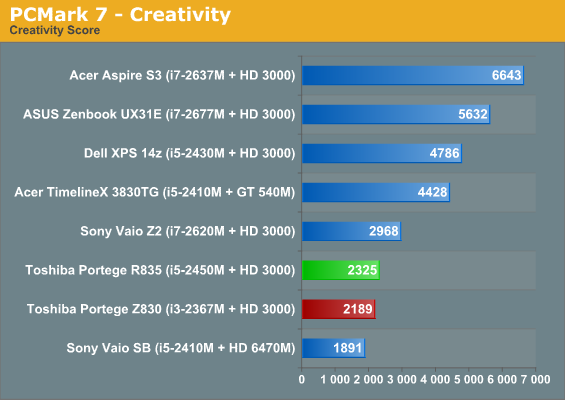
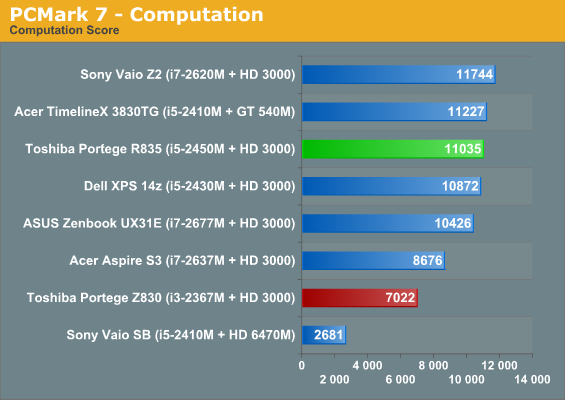
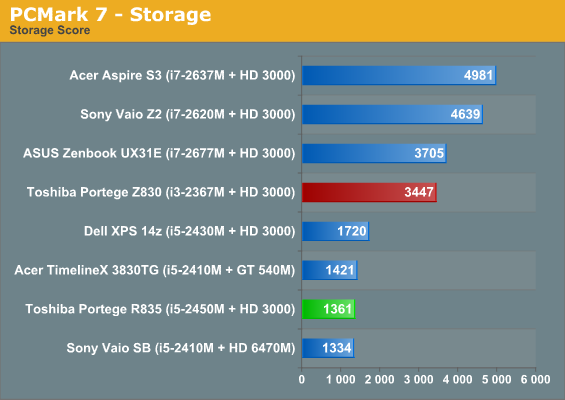
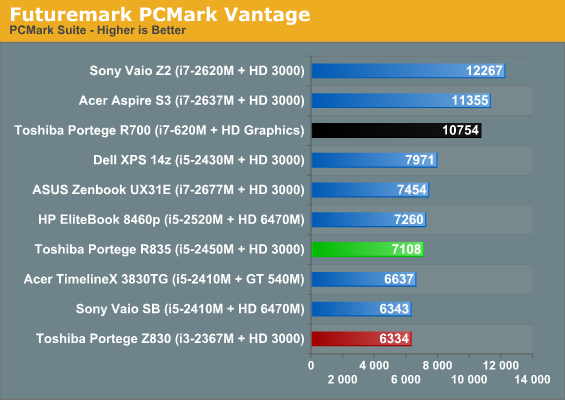
The PCMarks are always going to skew wildly towards any system that enjoys an SSD, so the bottom shelf 5400RPM hard drive in the Portege R835 isn't doing it any favors here. Let's see what happens when we shift performance squarely to the CPU.
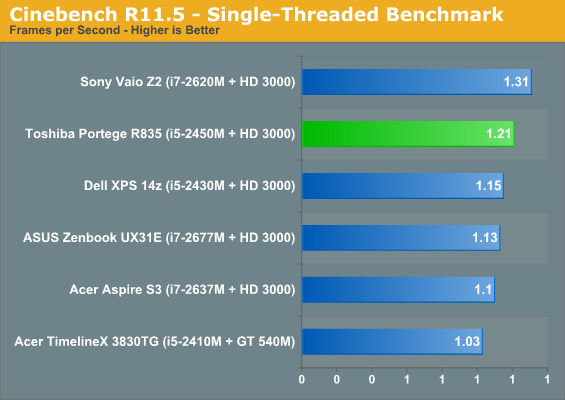
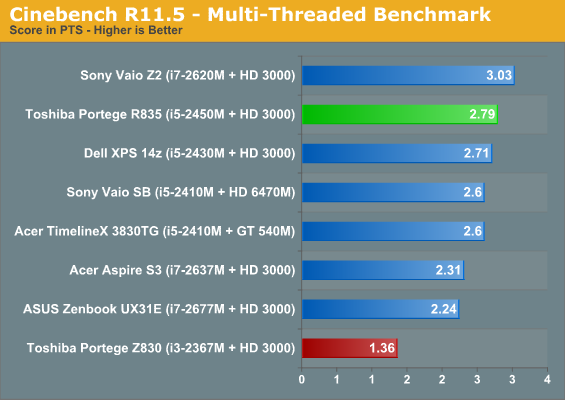
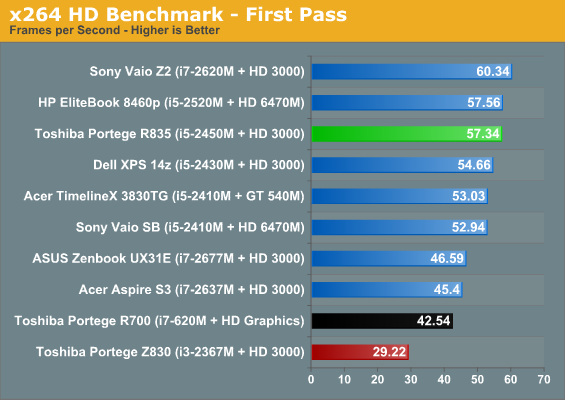
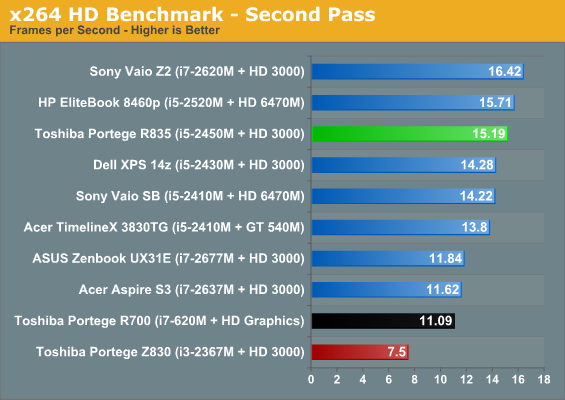
The i5-2450M pulls off an impressive run, demonstrating that there's still a notable difference between a low voltage and a standard voltage chip. The R700's last-generation processor is soundly beaten by this generation's low voltage chips, the turbo-less i3-2367M excluded.
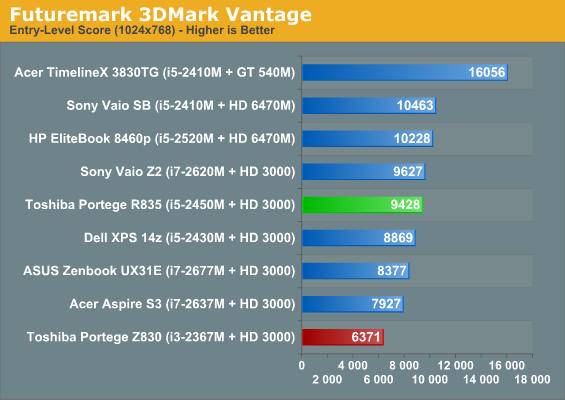
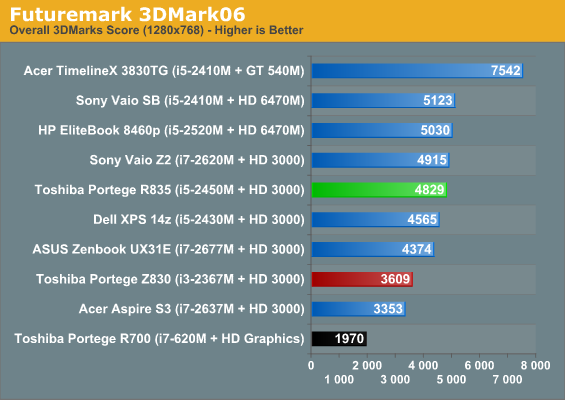
Without DirectX 11 support, Sandy Bridge graphics can't run 3DMark11, but 3DMarks Vantage and 06 demonstrate the importance of both having a faster processor and a faster IGP core. You're not going to be running wild in Battlefield 3 on the Portege R835, but nerds like me can still enjoy games like Magic: the Gathering - Duels of the Planeswalkers 2012 on the IGP.










81 Comments
View All Comments
Arkive - Monday, April 2, 2012 - link
While you might be right that the average user might buy a lower end laptop, the bulk of Anandtech readers do not fall into that category I don't think. Most folks here are power users and will generally shell out a little more money for a laptop than the average user, so in this case, I think focusing on $1,000+ laptops makes sense for the site.dananski - Friday, March 30, 2012 - link
I don't think it's right to say "you're doing it wrong" if your computer doesn't boot up quickly from HDD. People have different requirements and I expect yours are quite minimal, allowing you to reduce startup programs and clutter and get a decent experience from a relatively slow drive. Other people will need quicker access to more/heavier applications.Mind you, I agree the storage/price ratio will put many standard users off. I managed to get a laptop with both a smallish, nippy SSD and a slow but spacious HDD for the best of both worlds, but very few companies seem to offer that.
gorash - Friday, March 30, 2012 - link
Most people don't even know what a GB is. They probably fill the laptop up with just a couple of photos and use about 1% of the HDD space.gorash - Friday, March 30, 2012 - link
But I bet that if the laptop boots up in 15 seconds instead of 30 seconds then they'll think "Wow! This laptop is so FAST!"Snotling - Saturday, March 31, 2012 - link
I agree, most companies are perfectly happy designing products for ignorant people who look at numbers and don't understand what they mean. Just put in a number where less is more and they'll buy the bigger one anyway!nowadays, products are designed to fit a price-point, not to fill a purpose and that's the big problem. Only a few companies do it the other way around, Apple is unfortunately one of them, Dyson is another.
I want a laptop for "work" not for 700$ once you realize that, then you don't mix the More RAM = needs discreet graphics. a dumb mix for a "worker's laptop" since it'll eat at the battery and provide no added value. but that's what they do. throw in a 1080p display instead, I'll see more lines of my spreadsheet. They just won't, the ignorant are too many and too lucrative a market to bother with people who make informed purchase decisions.
KPOM - Sunday, April 1, 2012 - link
256GB SSDs are now about $400, plus with the HDD shortage, the premium is a little bit smaller. Plus, how many people really need all that storage in a portable. I have used a MacBook Air with an SSD since late 2008 and I hate going back to my HDD-equipped work PC. Lots of tasks, not just booting, seems a bit sluggish, particularly when I see that hard drive LED blinking away.Put an SSD-equipped machine next to a HDD-equipped machine, and it's easy to see the difference in opening and closing programs. People get fixated on the processor, but the weakest link in the chain in the HDD.
The whole point of the ultrabook project is to get away from the $350-$500 bulky commoditized notebook.
frostyfiredude - Friday, March 30, 2012 - link
There are obviously a lot of people who don't mind the HDD, yes even semi-enthusiasts. Others may require a HDD for storage reasons, especially if it's their only computer. Plenty of my friends have filled up their 320-500GB HDDs almost to the rim with who knows what, there is no way they would buy a 1100$ 512GB SSD to fit all their data in. Manufacturers clearly realize this and so we are seeing most laptops with HDDs, sometimes with the option to upgrade to a SSD in more premium models.The choice for a decent SSD from Toshiba for a reasonable price would be very welcome here, but as the only option I disagree.
That said, in notebooks and desktops over ~600$ I think an mSATA SSD cache drive or hybrid HDD should be standard by now; they are good stop gap options until the market is ready for SSDs and SSDs have a good enough $/GB ratio. They offer solid bumps in responsiveness for an only minor price bump, while still maintaining the storage capacity wanted/required by a decent amount of buyers.
Also 13" and under laptops should no longer have optical drives while we're at it, fill the space previously occupied by the drive with a larger battery and ship an external drive for the once in a blue moon time it's required.
cclark1593 - Saturday, March 31, 2012 - link
SSDs are good, but with limited space, they're not quite ideal for someone looking at a laptop as a main computer if said computer only has space for one drive.That said, I think anyone looking at a laptop for a main should not be looking at ultrabooks, or anything such, but a 16" or even a 17" with at least two drive bays. This allows use of both a SSD and a mechanical HDD, and is a nice arrangement that would make large laptops enticing to buyers.
Calin - Monday, April 2, 2012 - link
"You can buy a fantastic 120GB SSD for <=$120"But 90% or more of the laptops I've seen have only space for one hard drive, and 120GB might not be large enough for a lot of prospective buyers.
But I totally agree with rudolphna - I understand that those review units are provided by their builders (and not bought by Anandtech), but I would prefer laptop tests to be done in close to the default configuration.
yyrkoon - Tuesday, April 3, 2012 - link
A perfect example of why personal opinion should be left out of reviews.The reviewed hardware obviously came with a HDD, and not an SSD. An informed purchaser will know this before buying. e.g. a moot point.
1) The buyer is clueless, and it wont matter anyhow.
2) The potential buyer knows what he/she wants and . . .
a) opts out.
b) Purchases laptop + SSD
c) is perfectly happy with included storage media.
System stability, performance of the included hardware ( not what *could have* been included ), cooling, noise, screen quality, warranty, price. These, among others are what is important. The order of which is most important is again, subjective ( personal opinion ).
Personally, I would be far more worried about the super high temps. Than worrying about something I should have already known when I bought the system.
@Dustin
For what it is worth, I have an ASUS AMD A3400 A6 laptop that runs warm too when under a full load. Though, not quite that warm, unless overclocked. 74C is about as high as it goes standard. So perhaps the cooling "issue" is not so much an Intel/Toshiba issue. Still, it has me a bit worried. *shrug*